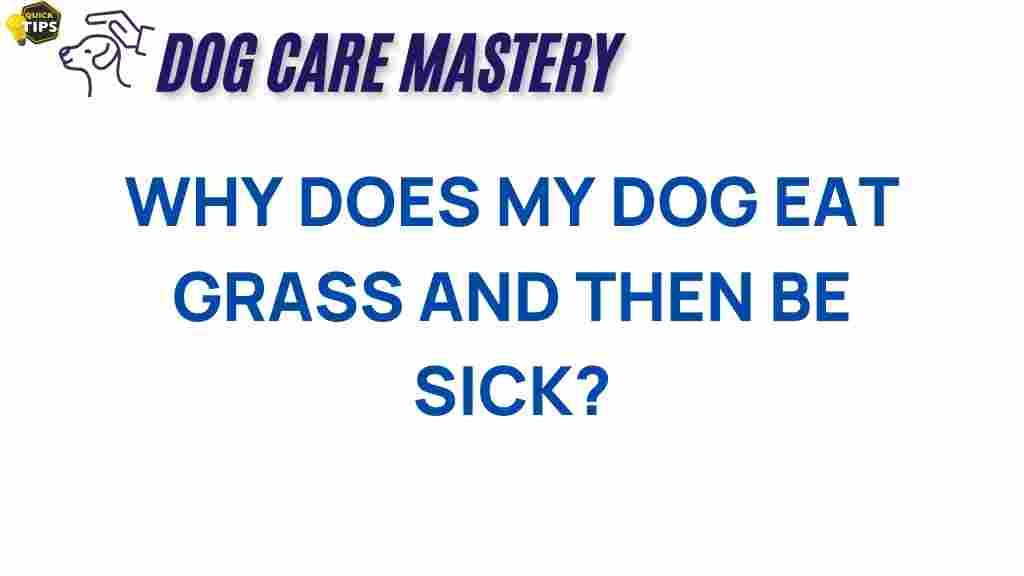Understanding Dog Behavior: The Curious Case of Dogs Eating Grass
As pet owners, we often find ourselves puzzled by the quirky behaviors of our furry friends. One such behavior that raises eyebrows is when dogs eat grass. This peculiar habit has led many dog owners to question the reasons behind it. Is it a sign of illness, a natural instinct, or simply a quirky aspect of dog behavior? In this article, we’ll delve into the curious case of dogs eating grass, exploring the motivations behind this behavior and what you need to know to ensure your dog’s health and happiness.
Why Do Dogs Eat Grass?
Understanding the reasons behind this behavior is crucial for every dog owner. Here are some common theories regarding why dogs eat grass:
- Natural Instinct: Some experts believe that grass eating is a natural instinct inherited from wild ancestors who consumed the entire prey, including its stomach contents.
- Digestive Aid: Dogs may eat grass to help with digestion. Some dogs may feel an upset stomach and instinctively seek out grass to induce vomiting or relieve discomfort.
- Nutritional Deficiency: A lack of certain nutrients in a dog’s diet may lead them to seek out grass for additional fiber or vitamins.
- Boredom or Anxiety: Dogs may engage in this behavior as a way to cope with boredom or anxiety, especially if they lack sufficient physical or mental stimulation.
- Curiosity: Dogs are naturally curious creatures. They may simply enjoy the texture or taste of grass, leading them to munch on it out of curiosity.
Step-by-Step Guide to Understanding and Managing This Behavior
If your dog has developed a habit of eating grass, it’s essential to monitor their behavior and ensure their health. Here’s a step-by-step guide to help you manage this behavior:
Step 1: Observe Your Dog
Pay close attention to when and how often your dog eats grass. Note any patterns or triggers that might be associated with this behavior. Observing your dog can help you identify if it’s linked to a specific situation, such as after meals or during walks.
Step 2: Assess Their Diet
Evaluate your dog’s diet to ensure they are receiving balanced nutrition. A diet lacking in essential nutrients may lead to grass-eating. Consult your veterinarian to discuss your dog’s food and consider switching to a more nutritious option if necessary.
Step 3: Provide More Stimulation
If boredom seems to be a factor, increase your dog’s physical and mental stimulation. Engage in regular playtime, provide puzzle toys, or enroll them in training classes. Keeping their minds engaged can reduce the desire to eat grass.
Step 4: Redirect the Behavior
If your dog is fixated on eating grass during walks, redirect their attention with a toy or treat. Reward them for focusing on you instead of the grass. This can help teach them that there are more rewarding activities than munching on greens.
Step 5: Monitor Their Health
Keep an eye on your dog’s overall health. If they frequently vomit after eating grass or show signs of distress, consult your veterinarian. Persistent vomiting or other health issues may indicate an underlying problem that needs to be addressed.
Common Concerns About Grass Eating
While occasional grass eating is typically harmless, there are several concerns that dog owners should be aware of:
- Potential Toxicity: Not all grass is safe for dogs. Some plants may be treated with pesticides or herbicides, which can be harmful. Ensure your dog only has access to untreated grass.
- Gastrointestinal Issues: If your dog frequently vomits after eating grass, it may signal an underlying digestive issue. Regular vomiting should warrant a visit to the veterinarian.
- Behavioral Issues: If grass eating is accompanied by signs of anxiety or compulsive behavior, it may be beneficial to consult a professional dog trainer or behaviorist.
Troubleshooting Tips for Grass Eating Behavior
If your dog’s grass-eating behavior becomes concerning, consider these troubleshooting tips:
- Limit Access: If your dog shows a strong desire to eat grass, consider limiting their access to grassy areas during walks.
- Alternative Snacks: Offer safe, dog-friendly snacks as an alternative to grass. Carrots, green beans, or commercial dog treats can satisfy their urge to chew without the risks associated with grass.
- Regular Vet Check-Ups: Regular veterinary check-ups can help identify any potential health issues that may lead to abnormal behaviors.
When to Consult a Veterinarian
While occasional grass eating is generally considered normal, there are specific scenarios in which you should consult a veterinarian:
- If your dog is frequently vomiting after eating grass.
- If there are noticeable changes in appetite or weight.
- If your dog displays signs of lethargy, diarrhea, or other health concerns.
- If your dog begins to eat non-food items (a behavior known as pica).
Early intervention can prevent more severe health issues down the line, so don’t hesitate to reach out to a professional if you have concerns about your dog’s health or behavior.
Conclusion: Embracing the Quirks of Dog Behavior
Understanding your dog’s behavior is an essential part of being a responsible pet owner. Dogs eating grass can be a perplexing yet normal part of their behavior. By observing their habits, providing a balanced diet, and ensuring they receive enough stimulation, you can manage this behavior effectively.
While grass eating can sometimes indicate underlying health issues, it’s often just another quirky aspect of dog behavior. Embrace these moments with your furry friend, and remember that their well-being is always the top priority.
If you’re interested in learning more about dog behavior, consider exploring resources like the American Kennel Club here. And for tips on effective training techniques, you might want to check out our training guide here.
This article is in the category Behavior and created by dogcaremastery Team
